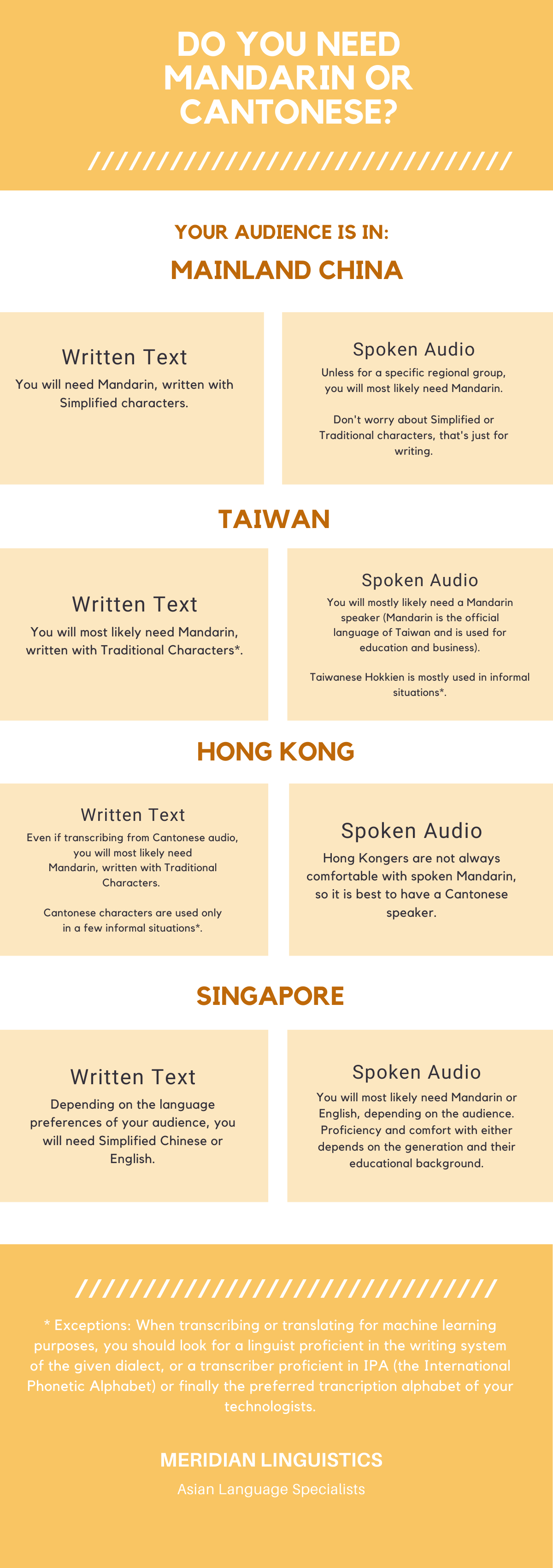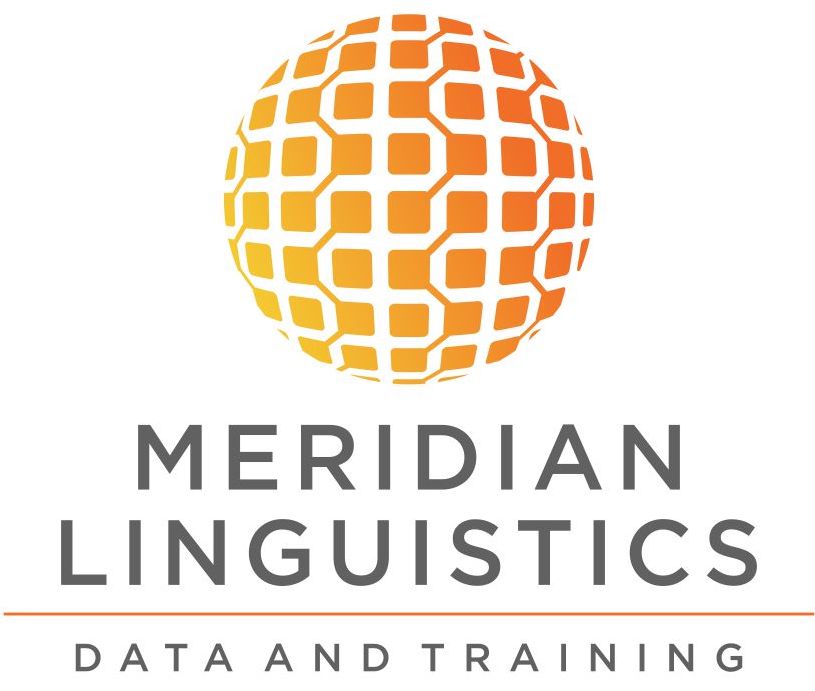Mandarin versus Cantonese, Simplified versus Traditional…it can all get a bit confusing! Even native speakers of Chinese languages sometimes aren’t quite sure what their clients need.
Since our clients often need our help to figure out which language and which writing system they need, we decided to do a blog post on the topic.
Spoiler alert: it is a bit more complex than you might think.
We’ll ease you in with an infographic, then get into more details below.

As you can see in the infographic, there are several Chinese languages used throughout the Sinosphere.
We’ve limited ourselves to discussing Mandarin and Cantonese here, although there are hundreds of others.
Other than Mandarin, Cantonese is our most-requested Chinese language at Meridian Linguistics.
But if Mandarin is the official language of China, when do businesses need Cantonese?
.
When Does Your Business Need Cantonese Language Services?
You will need Cantonese language services when you’re working with recorded audio for/from Hong Kong or Guangdong
The most common use case for Cantonese services are when you are working with audio that is for (or came from) a Cantonese speaker.
That Cantonese speaker might be from Southern China (the Guangdong region) or from Hong Kong.
.
Training Data for Automatic Speech Recognition
If you are developing Automatic Speech Recognition (ASR) for a smart speaker or voice assistant to serve this region, then you will need Cantonese voice samples for your training data.
You might also need Cantonese transcription (either into Cantonese characters or IPA).
.
Subtitles
If you’re subtitling a Cantonese video (whether for marketing, media, or other purposes), you’ll need subtitlers that understand Cantonese audio. This is because many Mandarin speakers will not understand Cantonese.
However (and this might seem confusing!) the subtitles for that video will almost always be in Mandarin.
The subtitles should be written using Traditional characters for Hong Kong, or Simplified characters for Mainland China or Singapore.
Most educated Cantonese speakers will know how to transliterate Cantonese speech into written Mandarin.
.
You will need Cantonese language services if you looking for spoken interpretation (live translation)
In Southern China and Hong Kong, most residents will prefer to speak in Cantonese. This is the case even if they are proficient in writing Mandarin.
If you are looking for an interpreter for a business meeting or a call, make sure you hire one that is fluent in Cantonese.
.
You usually do NOT need Cantonese language services if you are working only with text
With a few exceptions, you will not need a Cantonese linguist if you are working exclusively with text.
If you are translating an English document into Chinese for a Hong Kong or Taiwanese readership, you will need the linguist to write in Mandarin with Traditional Characters.
Remember, Traditional Characters are not equal to Cantonese. Traditional characters are just a way of writing – Cantonese is a way of speaking.
Exception: if you need a verbatim transcription of Cantonese audio.
You might need this if you need to retain very detailed information about slang language that was used. You might also need verbatim transcription if your purpose is to develop Cantonese speech recognition or text-to-speech technologies.
In those cases, you will need transcription into either Cantonese characters, or another system suited to Cantonese such as Jyutping or IPA.
Still confused? No problem. Check out the below table for a few more examples, or feel free to reach out and talk to one of our linguist consultants directly.
Use Case | Cantonese or Mandarin? |
| English into Chinese translation of a survey, memo, interview for use in China or Singapore | Translation into Mandarin with Simplified Characters |
| English into Chinese translation of a survey, memo, interview for use in Taiwan or Hong Kong | Translation into Mandarin with Traditional Characters |
| English into Chinese translation of a slangy blog post, marketing materials or ads | Could be translation into Mandarin with Traditional characters, or you might consider translation into Cantonese written with Cantonese characters |
| Transcription of Cantonese audio into Chinese for a general readership (e.g. news interview, subtitles) | Needs a Cantonese transcriber, who will transcribe into Simplified Mandarin (for China or Singapore) or Traditional Mandarin (for Taiwan or Hong Kong). See our article about Cantonese transcription. |
| Transcription of Cantonese audio for speech recognition, text-to-speech, or other AI/machine learning purposes | Needs a Cantonese transcriber, who will transcribe into Cantonese characters, Jyutping or other romanization systems, or IPA (the International Phonetic Alphabet) |
More questions? Feel free to reach out for Cantonese or Mandarin language services, a linguist will get back to you right away.




Leave A Comment